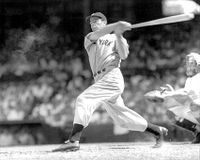 Handing The Bat To Joe DiMaggio
Handing The Bat To Joe DiMaggioBy Steve Amoia
An American Cultural Icon
If you ever played baseball, the mystical name of DiMaggio was as familiar as the crack of the bat, or the thud of the ball hitting the back of the catcher's mitt. Just like cold beer, hot dogs, and the seventh inning stretch, Joe DiMaggio was an integral part of American baseball tradition and lore.
If you grew up Italian as I did, you never referred to him as Joe or DiMaggio. It was always Mr. DiMaggio. He became an American icon; however, to Italian-Americans, he represented much more than the perfect swing, the graceful strides, or "The Streak" that would make him immortal. Mr. DiMaggio embodied what our people could achieve despite discrimination and media stereotypes that unfortunately still linger even today.
Giuseppe Paolo DiMaggio was born in Martinez, California, on 25 November 1920. He was the eighth of nine children born to Giuseppe and Rosalie, who were immigrants from the Sicilian island of Isola della Femmina (Island of the Women.) His father was a fisherman; however, young Joe did not like the rigors of Fisherman's Wharf. He preferred to play on the sandlots of North Beach, which was and is an Italian section of San Francisco.
His father thought that Joe was lazy, and hoped that the allure of baseball would soon leave his son. Like most immigrant fathers, he wanted more for his children than a future of working the docks of San Francisco. But Joe was not an avid student, and at the age of 16, he dropped out of Galileo High School, and worked various laborer jobs for the next few years. He played semi-professional baseball for the San Francisco Seals, and in due course, was scouted and later signed by the New York Yankees.
Rare Childhood Opportunity
My father, Michael Amoia, had a rare opportunity as a child. His family lived near Griffith Stadium, which was at that time the home of the Washington Redskins and Senators. My father was very athletic, and competed in baseball and football for his high school, McKinley Technical. Somehow, and it remains a family mystery, my father obtained a job working for both the Redskins and Senators. My grandfather was not a sportsman, and one can imagine that few adolescents would have been brave enough to walk into the administrative offices of Griffith Stadium to ask for a job.
The ironic facet of this story was that few of his old friends knew about this part of his life. When I mentioned the anecdote during his eulogy, several of his friends approached me later with seeming disbelief. It was a part of my father’s life that was very private, but one that always fascinated me. During his life, he would mention DiMaggio on occasion.
I had an older cousin, Rob, who had heard the story in more detail. My father worked in the clubhouse for the Redskins, and was a batboy for the Washington Senators, where his domain was the visitor's dugout. He handed Joe DiMaggio his bat on several occasions. Dad was able to observe Mr. DiMaggio both on and off the field. The experience was imbued upon his memory. Even as my father developed Alzheimer’s Disease, the mere mention of Joe DiMaggio would bring a smile to his face.
Personal Reflections by Michael Amoia
Dad, what was he like? "He was a very quiet and private man. In the clubhouse, he didn't say much, and the other players left him alone. But you knew he was their leader. He had custom-made suits, and always looked sharp. He even looked good in those baggy uniforms they wore back then. He used to drink coffee and smoke Chesterfields between innings, and a few times I had to run out to by him smokes. You were told by the Senators to treat all the players the same, but with DiMaggio, it was a different story... His family was Sicilian. After the games, he used to sign balls for me. I sold them outside the stadium for $1. That was a lot of money in those days. That's how we were paid. We had to ask the players to sign balls or broken bats."
What made him great? "Instincts. He always seemed to do the right thing. You never saw him out of position in the outfield. He was quick as a cat. Strong arm. Didn't miss cutoff men. At bat, you never saw a smoother or quicker swing. Only Ted Williams was a better hitter. He could hit for power and for a high average. He was very graceful for a big man. He played each inning as if it were his last. I never saw him get angry."
Few of us could have such a childhood memory. It is said that youth is wasted on the young; however, in my father’s case, I would beg to differ.
Copyright © 2006 by Steve Amoia. All rights reserved. Photo courtesy of Wikipedia where it qualified as free use under U.S. copyright law.
About the author
Steve Amoia is a freelance writer and also designs personal web pages. He lives in the Washington, D.C. area. He has published articles and book reviews about alternative health, career-related themes, Italian and international soccer, along with martial arts. He also maintains a non-profit web site dedicated to World Football (soccer) that includes an interesting Argentine family connection made possible by the Internet. His writing portfolio, along with the soccer site, may be found at http://www.sanstefano.com, and his email address is info@sanstefano.com.
No comments:
Post a Comment